
DIGESTIVE DISEASES AND SCIENCES
Scope & Guideline
Pioneering research in gastroenterology and physiology.
Introduction
Aims and Scopes
- Gastrointestinal Disorders and Diseases:
The journal publishes research on various gastrointestinal diseases, including inflammatory bowel disease (IBD), liver diseases, gastroesophageal reflux disease (GERD), and colorectal cancer, aiming to enhance understanding and treatment of these conditions. - Interventional Endoscopy and Advanced Therapeutics:
It features studies on endoscopic techniques, innovations in surgical interventions, and the use of advanced therapeutic methods such as endoscopic ultrasound and endoscopic mucosal resection. - Clinical Outcomes and Quality of Life:
Research focusing on patient outcomes, quality of life assessments, and healthcare utilization in patients with gastrointestinal disorders is a key area of interest, providing insights into the effectiveness of treatments. - Microbiome and Gut Health:
The journal explores the role of the gut microbiome in digestive health and disease, including its impact on conditions like IBD, obesity, and colorectal cancer, reflecting a growing interest in the microbiome's therapeutic potential. - Pharmacological Interventions:
Studies on pharmacological treatments for gastrointestinal diseases, including the use of biologics and novel therapeutic agents, are central to the journal's focus, emphasizing evidence-based clinical practices. - Epidemiology and Health Disparities:
Research addressing epidemiological trends, health disparities, and risk factors for gastrointestinal diseases is highlighted, promoting awareness and understanding of these critical issues.
Trending and Emerging
- Telemedicine and Digital Health:
The COVID-19 pandemic has accelerated the adoption of telemedicine in gastrointestinal care, leading to increased research on the effectiveness and patient satisfaction with remote consultations. - Patient-Centered Care and Shared Decision-Making:
There is a growing emphasis on patient-centered approaches, including shared decision-making and patient-reported outcomes, reflecting a broader trend in healthcare towards valuing patient perspectives. - Artificial Intelligence and Machine Learning:
Research utilizing artificial intelligence and machine learning for diagnostic tools and predictive analytics in gastrointestinal diseases is emerging, showcasing the potential for technology to enhance clinical practice. - Microbiome Research and Its Clinical Implications:
The exploration of the gut microbiome's role in health and disease is expanding, with increasing studies focused on its implications for treatment strategies in conditions like IBD and obesity. - Multidisciplinary Approaches to Care:
The integration of multidisciplinary teams in managing complex gastrointestinal conditions is gaining traction, highlighting the importance of collaboration among specialists in improving patient outcomes.
Declining or Waning
- Traditional Surgical Approaches:
There is a noticeable decrease in the publication of studies focusing on traditional surgical techniques for gastrointestinal diseases, as the field shifts toward minimally invasive and endoscopic approaches. - Basic Science Research:
The journal has seen a decline in the number of basic science studies, particularly those focusing solely on molecular biology and pathophysiology, as the emphasis moves toward clinical applications and translational research. - Single-Center Studies:
There is a trend away from single-center studies towards multicenter and larger cohort studies, which are more likely to provide generalizable findings and insights into diverse populations. - Epidemiology of Rare Diseases:
Research focusing on the epidemiology of rare gastrointestinal diseases is becoming less frequent, possibly due to a shift in interest toward more prevalent conditions and broader public health issues.
Similar Journals

DIGESTION
Fostering dialogue and insights in the world of digestion.DIGESTION is a prestigious journal dedicated to advancing the field of gastroenterology, published by KARGER, a renowned publisher based in Switzerland. With a rich history dating back to 1896, this journal has continuously evolved and serves as a vital platform for researchers, professionals, and students alike. DIGESTION is recognized for its scholarly contributions, holding an impressive rank of 23 out of 167 in the Scopus database, placing it within the top 14% of gastroenterology journals, as evidenced by its Q2 classification. The journal's commitment to high-quality research is reflected in its wide-ranging scope, addressing various aspects of digestive health, clinical practices, and innovative therapies. Though not an open-access journal, it provides comprehensive access options that ensure the dissemination of crucial research findings to the global community. As we move towards 2024, DIGESTION continues to facilitate dialogue and insights in gastroenterological research, making it an indispensable resource for those in the field.
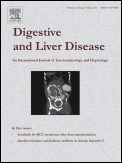
DIGESTIVE AND LIVER DISEASE
Exploring the frontiers of digestive and liver health.DIGESTIVE AND LIVER DISEASE is a prominent journal published by Elsevier Science Inc, dedicated to advancing the field of gastroenterology and hepatology. With an ISSN of 1590-8658 and an E-ISSN of 1878-3562, this journal has established itself as a significant resource within the academic community, especially considering its Q2 ranking in both gastroenterology and hepatology categories as of 2023. Spanning from 2000 to 2024, the journal presents a diverse array of peer-reviewed articles, clinical studies, and review papers that explore the latest advancements and research findings in digestive and liver diseases. The journal's robust impact, reflected in its Scopus rankings—40th out of 167 in gastroenterology and 28th out of 82 in hepatology—highlights its critical role in shaping practices and understanding in these vital areas of medicine. With open access options available, DIGESTIVE AND LIVER DISEASE aims to make high-quality research accessible to a wider audience, thereby encouraging collaboration and innovation. Researchers, healthcare professionals, and students alike will find valuable insights into the complex mechanisms, diagnostics, and therapeutic strategies pertinent to digestive and liver health.
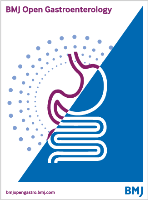
BMJ Open Gastroenterology
Connecting Researchers for a Healthier Gastrointestinal FutureBMJ Open Gastroenterology is a premier open access journal published by the esteemed BMJ Publishing Group, focusing on the dynamic and evolving field of gastroenterology. Established in 2014, the journal has rapidly ascended in stature, reflected in its impressive 2023 Q1 ranking in gastroenterology and its position within the top 25% of journals in the category according to Scopus. With a mission to disseminate high-quality, peer-reviewed research with global significance, the journal provides a vital platform for researchers, professionals, and students alike to share their findings and advancements in gastrointestinal medicine. Operating from its headquarters in London, England, the journal's open access format ensures wide visibility and accessibility of cutting-edge research, making it an invaluable resource for those dedicated to improving patient care and driving innovation in gastroenterological sciences. By engaging with this journal, contributors and readers can stay at the forefront of critical developments in the field, fostering a collaborative environment for knowledge exchange.
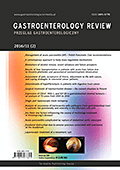
Gastroenterology Review-Przeglad Gastroenterologiczny
Bridging Research and Practice in GastroenterologyGastroenterology Review-Przeglad Gastroenterologiczny is a premier, peer-reviewed journal published by TERMEDIA PUBLISHING HOUSE LTD, focusing on the dynamic field of gastroenterology. Since its inception in 2006, it has embraced an Open Access model, ensuring that the latest research is readily accessible to a global audience, fostering collaboration and innovation. Based in Poland, this journal serves as a crucial platform for disseminating significant findings in gastrointestinal research, with a current Scopus rank placing it at the 39th percentile in its category. With a commitment to advancing the understanding of gastroenterological conditions, *Gastroenterology Review* publishes original articles, reviews, and case studies that contribute to both clinical practice and academic research. The journal is particularly aimed at researchers, healthcare professionals, and students who ignite dialogues that shape the future of gastrointestinal health. Explore the comprehensive insights that this journal offers, as it encapsulates vital developments from 2008 to 2024 in the ever-evolving landscape of gastroenterology.

Korean Journal of Gastroenterology
Elevating Understanding of Gastrointestinal DisordersKorean Journal of Gastroenterology (ISSN: 1598-9992, E-ISSN: 2233-6869), published by the Korean Society of Gastroenterology, has been a premier outlet for research and advancements in the field of gastroenterology since its inception in 1968. This open-access journal, based in South Korea, fosters a global dialogue on gastrointestinal health, embracing contributions from a diverse array of disciplines within medicine. It is currently ranked in the Q4 quartile for miscellaneous medicine and holds a Scopus rank of #323 out of 636 in general medicine, reflecting its commitment to publishing impactful research despite its relatively recent establishment in high-impact metrics. With a continuous publication timeline extending through to 2024, the journal aims to enhance understanding of gastrointestinal disorders and promote innovative treatments, making it an essential resource for researchers, clinicians, and students alike who seek to stay abreast of the latest developments and clinical applications in gastroenterology.
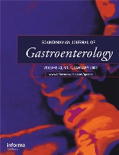
SCANDINAVIAN JOURNAL OF GASTROENTEROLOGY
Unlocking New Frontiers in Digestive Health ResearchSCANDINAVIAN JOURNAL OF GASTROENTEROLOGY, published by Taylor & Francis Ltd, is a leading journal in the field of gastroenterology, dedicated to advancing clinical and experimental research related to digestive health. With an ISSN of 0036-5521 and an E-ISSN of 1502-7708, this journal provides a platform for high-quality research that addresses the complexities of gastrointestinal diseases. Since its inception in 1966, the journal has consistently contributed valuable insights and is currently categorized in the Q2 quartile of gastroenterology journals, reflecting its impact and relevance in the field, with a Scopus rank of 87 out of 167 in Medicine - Gastroenterology. Researchers and practitioners are encouraged to explore the journal's archives to enhance their understanding and stay abreast of innovative strategies for managing gastrointestinal disorders. The SCANDINAVIAN JOURNAL OF GASTROENTEROLOGY remains a crucial resource for those committed to improving patient outcomes through rigorous scientific inquiry and the sharing of impactful findings.

Gastroenterology Insights
Innovating Research for a Healthier GutGastroenterology Insights is a premier open-access journal published by MDPI since 2009, focusing on essential research and developments within the fields of gastroenterology and hepatology. With a dedicated ISSN of 2036-7414 and E-ISSN 2036-7422, this journal serves as a vital platform for disseminating innovative studies and insights pertinent to gastrointestinal health, disorders, and treatment modalities. Based in Switzerland, Gastroenterology Insights boasts a significant academic presence, currently positioned in the Q3 quartile for both gastroenterology and hepatology categories as of 2023, reflecting its impactful contributions to the disciplines. With Scopus rankings placing it at the 94th and 48th positions in gastroenterology and hepatology respectively, the journal is committed to advancing knowledge and fostering collaboration among researchers, professionals, and students alike. By providing an open-access model, it ensures that high-quality research is accessible globally, thereby enhancing the reach and impact of crucial findings in the science of digestive health. Researchers looking to publish cutting-edge work will find Gastroenterology Insights a valuable resource for both sharing and acquiring knowledge.

Therapeutic Advances in Gastroenterology
Championing the future of gastroenterology.Therapeutic Advances in Gastroenterology, published by SAGE Publications Ltd, is a premier open access journal dedicated to the advancement of knowledge in the field of gastroenterology. Since its inception in 2008 and its transition to open access in 2018, the journal has consistently provided high-quality peer-reviewed research articles, review papers, and clinical studies that address the latest therapeutic advancements and challenges in gastrointestinal medicine. With an impressive impact factor and a 2023 Scopus ranking placing it in the Q1 quartile of gastroenterology journals, it stands as a leading platform for researchers, clinicians, and healthcare professionals. The journal’s commitment to disseminating impactful research has positioned it at the forefront of academic discourse, offering a vital resource for those devoted to improving patient outcomes in digestive health. The United Kingdom-based journal invites submissions that contribute to the understanding and treatment of gastrointestinal disorders, ensuring that cutting-edge findings reach a global audience.

Pediatric Gastroenterology Hepatology & Nutrition
Bridging research and clinical excellence in pediatric gastroenterology.Pediatric Gastroenterology Hepatology & Nutrition is a pivotal academic journal published by the Korean Society of Pediatric Gastroenterology & Nutrition, focusing on the critical fields of pediatric gastroenterology, hepatology, and nutrition. Located in South Korea, this journal aims to disseminate high-quality research, review articles, and clinical studies to advance knowledge and practice in the care of children with gastrointestinal and nutritional disorders. With a Converged Years span from 2012 to 2024 and categorized in the Q2 and Q3 quartiles in 2023 across multiple related fields, the journal holds a significant position within the academic community, reflecting its impactful contribution to the discipline. Although currently not open access, the journal ensures that content is accessible to a broad audience through various institutional subscriptions. The journal appeals to researchers, healthcare professionals, and students alike, providing an essential platform for the exchange of innovative ideas and research findings aimed at improving pediatric patient care.
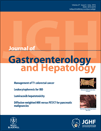
JOURNAL OF GASTROENTEROLOGY AND HEPATOLOGY
Pioneering research for a healthier digestive future.Welcome to the JOURNAL OF GASTROENTEROLOGY AND HEPATOLOGY, an esteemed publication in the field of gastroenterology and hepatology, proudly published by WILEY. Established in 1986, this journal serves as a crucial platform for researchers, healthcare professionals, and students, presenting groundbreaking research and comprehensive reviews that drive advances in understanding and treating gastrointestinal and liver diseases. With a strong reputation evidenced by its Q1 ranking in gastroenterology and Q2 ranking in hepatology, this journal ranks impressively in the Scopus metrics - positioned at #22 out of 167 in gastroenterology and #21 out of 82 in hepatology, reflecting its contribution to scholarly excellence. Although it does not offer open access options, the journal’s rich archive and diverse topics make it indispensable for those dedicated to improving patient outcomes in these critical areas of medicine. Whether you are a seasoned researcher or an aspiring medical professional, engaging with this journal will keep you at the forefront of the latest developments and emerging trends in gastroenterology and hepatology research.